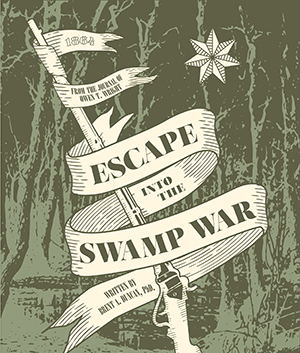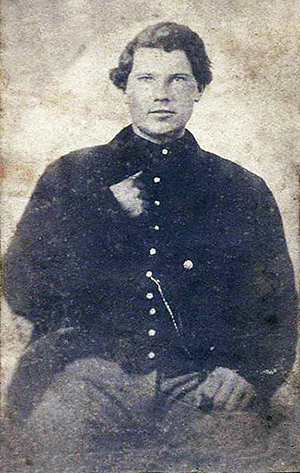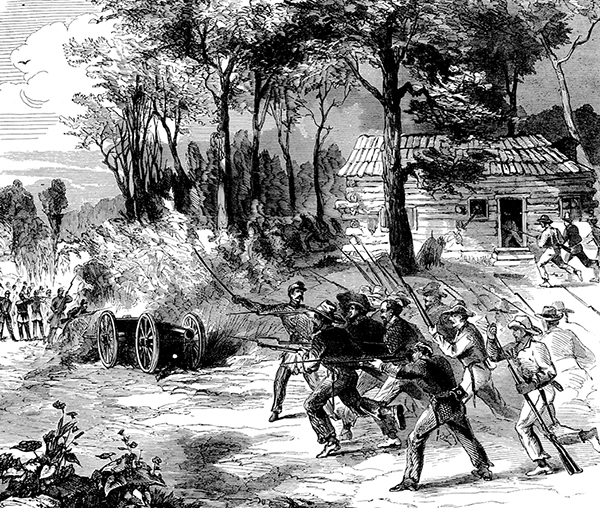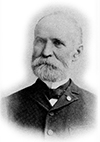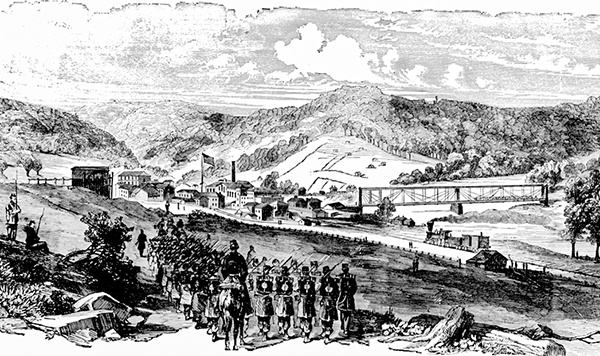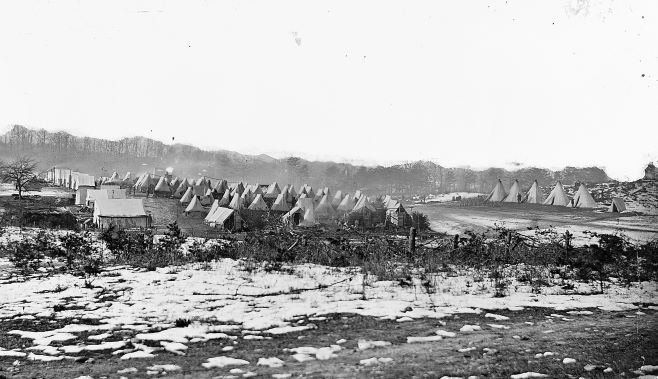Owen gets his first paycheck, then celebrates his 20th birthday. The 14th Indiana Volunteers dig in for the winter. Owen gets pitchfork by a farmer while sleeping in the hay.
October 6, 1861
It has been very nice weather since the brush which occurred on the 3rd. We shall make a forward movement into Eastern Virginia soon for we shall know the next time just how to attack them owing to the valuable information we gained on the 3rd.
October 8, 1861
We were ordered to strike tents which we hastily did and took up our line of march to some unknown place to us.
We traveled towards Hattonsville and camped insight of that little though far-famed town on account of its being the seat of operations in Randolph and Pocahontas Counties.
October 9, 1861
We had to cross the Lygart river to get to the above-named town. There had been a tremendous rain a few days before and the bridge was washed away by the irresistible tide consequently we had to cross on a temporary bridge made of wagons. We moved into a beautiful meadow opposite Hattonsville and camped. We expect to get our pay her in a few days! This is a much more beautiful place than on the cold rugged mountain where we had been encamped for three months liking on eight days.

October 14, 1861
We were paid off which I was very glad of and the balance of the Regiment for we had been in the service going on five months and had not received a cent. The privates received $34.66 which was $11 per month part of the time and $13 the other part. I owed the sutler $13 which reduced my pile to $21.66. However there was owing to me in the comp. $1.00, so I had $22.00 to send home. We are improving finely here since coming to the valley. Our health is gaining rapidly. We have to drill from 9 O'clock till 11 and from 2 O'clock till 4. This is more than we had to do on the mountain for we could not find enough ground up there to drill on!
October 28, 1861

We had everything inspected by Maj. Slemmer of Fort Pickens notoriety. When he inspetz, things must look clean and tidy.
It is very cool and the soldiers have been building turf chimneys to their tents.
November 1, 1861
November 1st was a nice day and the sun shown out very warm. There was a heavy frost on that morning and several preceding mornings.
November 4, 1861
November 2nd and 3rd there was a continual rain. Today snow could be seen from the valley at Hattonsville on the mountains towards the east.
Winter, stern cold winter, is almost here but we have got on a good supply of winter clothing.
November 6, 1861
There was three new recruits came into camp for our Company. They had traveled all day through the rain and were consequently very wet, tired and cold. They came from Webster on foot.
November 12, 1861
Received the news that our great fleet had landed within 25 miles of Charleston S.C. and that our troops would soon have that city in their possession. This was received with shouts and throwing up of caps. The Drum and fife was brought out and Yankee doodle and Hail Columbia was almost ward out by Cleag(?) Allen and our drum Major Mr. Kemp of Terre-Haute.
We began also to cut logs to build winter quarters, though it is not likely that we shall stay here all the winter.
Our Guard details were reduced from 8 men to 2 to a company. This was a great help to us soldiers and was very joyfully received.

November 13, 1861
Today I went out to where the boys were cutting logs to build our huts. They are cutting them on a very steep hillside which is about 200 yards to the top. All they had to do to get them down was to start them endwise and then slid down like seals sliding into the water. The huts I understand are to be 16 x 20 and five feet high to the eaves of the roof. We shall have plenty of room and even fix up our houses in Hotel style.
November 15, 1861
Yesterday it rained most of the day and this evening there is considerable snow. It is eight o'clock at night and we can hear the snow and hail rattling on the canvass of which our tents are made. We have commenced to build our huts and in a few days we hope to be housed safe till spring. This is the first snow that has fallen here except on the mountains. We have seen the snow on the mountain tops at several different occasions. On account of the rains recently the mud is truly horrible being almost knee-deep in places.
November 16, 1861
Snow six inches and still in our tents but manage to keep warm. Suspended operations on our winter huts on account of snow and cold.
November 17, 1861
Sunday. Today our chaplain came into captain's tent; spoke about having meeting today. Captain says no use, nobody would come out and if he had any faith in it, it was more than he had! Chaplain not daunted in the least but got up on a barrel in front of Company D and C a gave us a neat little sermon. This is greatly to his credit and shows his undaunted faithfulness in the soldiers of whom about fifty had come out of their tents to listen to the truths of the gospel.
May God bless and save him is my prayer.
November 20, 1861
Yesterday the 24th Ohio passed here towards Webster. Most of the 17th Ohio that was camped here also moved in the same direction and it is very evident that the balance of the brigade will follow soon. We have occupied the place where the 17th Ohio were and are splicing our logs with theirs, but do not expect to finish within twenty days. The plan differs some from the one on which we first began. Our Company is building seven huts altogether and they are ten feet square which makes the hole 70 feet long. We are also intending to build one room the same length. The huts are to sleep in and the large room adjoining is to have fire places in it for the company to cook in. So we will have our kitchen and sleeping rooms separate.
November 21st, 1861
Today was my birthday being 20 years of age.
We are getting along very slowly with our quarters. The mud is so deep that the logs can not be hauled fast enough.
November 23, 1861
Received news today that the rebels were leaving Greenbrier. They are building winter quarters 8 miles back towards Monterey. They are from accounts about 7000 strong between Greenbrier and Stanton.
November 28, 1861
Very cold and snow six inches deep. Today we were paid off again. The time was two months for which we received $26.00. News today that the rebels have entirely abandoned their works at Greenbrier. Our scouts say that they saw the effects of our shells on their works. They also state that there was 300 or 400 graves dated from the 3rd. to the 20th of October. This shows that there were several killed the day we made our reconnaissances (sic). There were in all about 800 graves which shows a great mortality in the rebel camp.
There has been encamped here till within in a few days since the 13th, 14th, 15th, and 17th were camped in this valley. The 13th 15th and 17th have gone and we are only left but the gallant 14th will surely follow in a few days.
December 2, 1861
Early in the morning three Companies pulled up stakes and moved towards Philippi. The remaining Companies will shortly follow.
December 4, 1861
Today the sun arose in all its splendor. The ground is frozed hard as adamant and the snow-peaked mountains loom up before your wandering vision like so many ghosts.
Yesterday evening the sunset in gorgeous hues and can not be described or painted better than a correspondent of Cincinnati Commercial did.
"Yesterday I saw such a sunset as Alexander Smith sung of—burning like the seal of God upon the close of day. The sun went out in gorgeous beauty and prodigally scattered clouds of gold on every hand. The portal of his exit was splashed with blood as if from some great battlefield.
"In the East Cheat Mountain Summit loomed up in the distance, clad with the garb of winter. How bleak and cold it looked—like the Finlanders Hell—cold, cold, bitter cold. The tall pine trees, encased in ice, and some seemed to me gigantic gravestones, where slept all of my lost hopes—all of my buried treasures. But as the sunlight swept up the chased by dark shadows, his last ray kissing the mountain tops gave to it a heavenly beauty. Its cold blue tint changed to a bright rose hue and every object stood out in glaring splendor."
December 4, 1861
The balance of the regiment consisting of seven Companies packed up and started to Philippi. We arrived at Beverly about sunset and camped about a mile from town on the north side. We had nothing to stay in and we built with the assistance of a few rails hard by large fires. After we had taken a nepaste (sic) of bread and meat we laid down in our blankets with nothing but the broad canopy of heaven over us.
We started at sunrise next morning. We bought apples, cakes, pies, etc. in abundance on the road. After noon we passed the battlefield of Sahirel(?) Hill. We arrived at Belington some us before sunset. I sat down at a table and ate my supper for which I paid the moderate sum of 25 cents. I lay in a barn hard by and slept very well. In the morning we were awaked by the man who was feeding his horses. One of us were awakened by a pitchfork being thrust close to his head which was mistaken for a part of a bundle of hay. This was at Belington.



